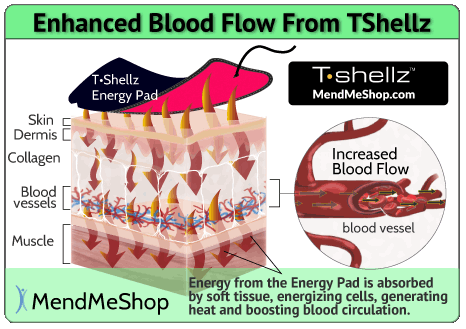
If you have a frozen shoulder, it's very important to heal it quickly and completely. Minimizing the healing time should be an obvious goal, as a chronic frozen shoulder will limit your ability to go about your daily routine for a long period of time. A seemingly small build up of trigger points in your shoulder muscles not properly cared for can lead to a chronic painful frozen shoulder injury that can persist for months or even years once adhesions begin to build.
These two tools are very effective for achieving highly effective results. These are the tools that physical therapists and physicians recommend to accelerate healing of muscle strains, trigger points and muscle atrophy every single day. And with our FDA Registered products, you can treat yourself at home. In fact, if you want to heal properly you have to treat yourself because you need to treat your frozen shoulder injury every single day.
The more inflexible your shoulder joint becomes, the more likely your joint will wind up permanently worsened due to chronic pain and increased adhesions in the joint. Adhesions means that your shoulder joint will not perform as well as it once did and it makes it much more prone to injury later on (long term pain is a common issue with frozen shoulder oftentimes even after surgical intervention). This is why it is massively important to deal with this injury properly right from the start. Heal it completely and fast to avoid a chronic injury.
Frozen Shoulder is the catastrophe that often happens after a shoulder impingement injury is left untreated. True frozen shoulder requires a physician to diagnose, and there are three major signs* for diagnosing this condition:
Frozen Shoulder is the one more misunderstood musculoskeletal conditions. The common belief is that Frozen Shoulder is idiopathic in nature (meaning, it does not have a true cause). While this may be true to a certain extent, there are a number of risk factors for developing the condition that people need to be aware of.

Most people we deal with tell us these scenarios have happened to them many times in the past. The real challenge is how do you promote blood flow to the shoulder injury site without causing further injury? This goal is further complicated by the fact the shoulder (and muscles controlling the shoulder joint) are involved in the majority of the physical movements we perform each day.
An injury to one shoulder muscle can easily lead to straining in other areas, making an overall recovery hard to initiate. For example, a serious muscle strain in the right rotator cuff can often lead to overstraining of the left rotator cuff. Most commonly, the injury occurs on the dominant side, so the risk of straining the other (weaker) side increases. The longer the injury (and corresponding pain) persists, the greater the chance that you will sustain more strain from overcompensation, eventually leading to issues in those areas as well. To minimize potential secondary injuries, know that it is important to deal with your muscle injury quickly and completely.
If you exhibit any of these Frozen Shoulder risk factors, then you need to increase your awareness of the condition and more importantly, take early steps to help prevent the condition from developing.
Approximately 20% of diabetics will develop one or more Frozen Shoulders during their lifetime. This compares to only 2% of the non-diabetic general population according to the American Academy of Orthopedic surgeons. A ten times greater risk factor is truly significant.
While researchers are still trying to determine exactly why diabetics are prone to Frozen Shoulder, there are some theories with scientific backing that help to make the determination.
One theory involves the metabolism of glucose and its affect on collagen. First of all, collagen is one of the main building blocks of soft tissue such as ligaments and tendons. The ligaments stabilize the joint by holding the bones in place while tendons connect the muscles to the bone, allowing for proper muscle function and also greater stability of the joint.
As we know, diabetics are unable to properly metabolize glucose. A simple sugar that provides fuel for all tissue in the body, glucose is critical for numerous metabolic functions.
In diabetics, it has been shown that glucose will attach itself to collagen tissue, in particular within the shoulder. While not fully understood why the shoulder is targeted, it does happen and the abnormal build-up of glucose on the collagen causes the shoulder to stiffen.
In a healthy body, collagen fibers normally move in concert with one another during movement of the muscle. In the case of diabetics, glucose binds the collagen fibers together (almost like a glue substance) and this limits the extensibility of the fiber.
This phenomenon is known as Glycosylation. The immobilization of the collagen fibers causes the shoulder to freeze and limit functional ability of the shoulder overall.
Frozen Shoulder predominantly affects middle aged women between the ages of 40 and 60.
Individuals who sustain a traumatic shoulder injury or undergo shoulder surgery are at risk for developing frozen shoulder.
Following these scenarios, the shoulder joint will be immobilized for a number of weeks. During this time, the body naturally makes an attempt to begin healing itself by producing a weak form of collagen (scar tissue) to help fuse the torn/cut tissue and to lay in place the foundation to heal.
Problems arise when the injured tissue (through immobilization) fails to receive the enhanced blood flow it needs to properly grow new, healthy tissue. As a result, the scar tissue continues to build to unprecedented levels.
Eventually, the accumulation of scar tissue will bond to healthy tissue within the joint capsule - and such bonds further restrict movement of the shoulder.
Hyperthyroid patients and those dealing with autoimmune disorders produce excess amounts of cytokines (chemical messengers) along with excess fibrous connective tissue - two factors that could lead to the development of Frozen Shoulder.
Cytokines play a pivotal role in the generation and management of immune and inflammatory responses. When produced in excess amounts, the body (and specifically, the immune system) are thrown into chaos.
What results is an abnormal immune response of the body against tissues found throughout the body, including the shoulder. In essence, the immune system can not differentiate between normal and abnormal substances and sets itself on a course of self-destruction. Over time, the shoulder joint capsule can slowly weaken and break down, leading to stiffness and general weakness of the shoulder.
What is interesting is that one portion of the immune system is attacking the body while other segments of the immune system will attempt to heal the damage that is being done. The end result is an excess build-up of fibrous tissue that once again - bonds to healthy tissue and causes loss in range of motion - the Frozen Shoulder so to speak.
As mentioned in the homepage, hyperthyroid suffers produce an excess amount of a hormone critical in the metabolic function of the body. When excess amounts of this hormone is produced, the body is unable to properly metabolize it and an autoimmune response ensues (inflammation and breakdown of healthy tissue).
On the other end of the spectrum, there is a segment of Frozen Shoulder sufferers who are hypothyroid - meaning their bodies do not produce enough of the thyroid hormone - Thyroxine.
Hypothyroidism results from the thyroid gland being unable to make enough thyroxine, which causes many of the body's functions to slow down. Included is the ability of the body to remodel damaged muscle and connective tissue. The body lacks the fuel it needs to heal - resulting in a long recovery process, especially in the case of Frozen Shoulder.
These potential risk factors should be looked at immediately, no matter what stage of Frozen Shoulder you are in.
You need to strongly recognize that if left untreated or improperly treated, frozen shoulder will typically last about 24 months. You will suffer through three distinct phases (sometimes called "3 stages of frozen shoulder"). If certain simple measures are taken, recovery can be accelerated. * Nearly all patients recover from frozen shoulder, but many often recover with a permanently reduced Range of Motion (ROM).
* Dias R, Cutts S, Massoud S. Frozen shoulder. BMJ?: British Medical Journal. 2005;331(7530):1453-1456.
It is important to know the stage you are currently in, as there are contraindications dependent on each stage. Many people ask of us: "How Long Does Frozen Shoulder Last"? The answer is that it is different for everyone but it can often take up to two years to resolve. If certain measures are taken (as described further down the page), recovery can be accelerated. Nearly all patient recover from Frozen Shoulder, but many often recover with permanently reduced Range of Motion. Don't let this happen to you. The 3 phases of Frozen Shoulder are as follows:
So many of our clients have achieved their goal of overcoming their frozen shoulder condition so quickly that it often even surprises us! The biggest key to their success is understanding their frozen shoulder disease (this includes getting a proper diagnosis, as misdiagnosis is common for the shoulder), learning what activities they should be undertaking, what activities they should be avoiding, and what treatment combinations they should be using.
Before YOU decide on a treatment path, an understanding on the three major stages of the healing process is critical. With the right knowledge and the right treatment options, you can accelerate your shoulder recovery without the fear of re-injury or setbacks (which unfortunately, happens to many people - we will explain why further down the page).
Inflammation is the body's natural response to a ligament, tendon, muscle (or ANY soft tissue) injury and is a normal part of the healing process - helping to reduce tissue infection in the early stages of injury. Swelling, pain, heat sensation, redness, and loss of function are the main symptoms experienced.
The combination of cold and static compression is the gold standard in medicine for minimizing tissue damage and reducing inflammation in the acute stage of injury or activity. It serves as a critical bridge into next phase of the healing process.
Ligaments and tendons are considered dense soft tissue. As a result, they naturally receive quite limited blood flow and this is precisely why injuries to these tissues take so long to heal. The challenge is, how do you effectively increase blood flow to soft tissue?

The end result; you relax the blood vessels within the injured tissues and surrounding areas. The vessels will naturally expand and allow for more blood flow to reach the very tissues you are trying to heal. In addition, this process will help clear the area of toxins and excess fluid build up, thereby reducing inflammation.
With dedication, the right tools, and the right information - you will achieve your goal of a sustainable recovery while minimizing scar tissue growth and maximizing your range of motion. When it comes to frozen shoulder, our goal is to do everything we can to get rid of your condition as soon as possible while winding up with no loss of Range of Motion (ROM); remember that permanent loss of ROM is a common issue with frozen shoulder sufferers even after their frozen shoulder has completely healed. A combination approach of cold compression, TShellz Wraps® treatments, stretching and proper support done on a frequent basis will, in our opinion, give you your best chance of recovering fast, fully and with minimized ROM loss. True, effective healing will differ from person to person, but we have witnessed that best results come from those that take a comprehensive, dedicated approach.

If you have questions, call our office at 1-866-237-9608 (toll free continental US).
We are very confident our TShellz Wraps and exercise ebook products will assist you in recovering from your injury by reducing your swelling and inflammation induced pain, maximizing blood flow where it's needed most and increasing the flexibility / range of motion of your shoulder with consistent, safe stretching.
Here at AidMyFrozenShoulder we pride ourselves in helping you with your healing and recovery process. Everyone at AidMyFrozenShoulder has tested and used the products, finding solutions to conditions that do not fit into the norm. This dedication to our customers and our products goes hand-in-hand with our guarantees to you as a customer:


Click HERE to Go To Our Online Store We take all major credit cards and Paypal. If you are on your mobile phone, Click to Call Our Office (toll free continental NA).
Our customer service lines are open 5 days a week helping people understand their injuries and how to treat them. Simply call toll free 1-866-237-9608 to talk with one of our knowledgeable Product Advisors. They have the ability to answer questions and even put together a treatment plan for you.
The TShellz Wraps® are FDA Registered Medical Devices, are suitable and completely safe for patients to use themselves at home (as instructed).
North America Toll Free 1-866-237-9608
Outside North America +1-705-532-1671
Living with pain is never easy and we encourage you to call us with any questions regarding how our products might relate to your frozen shoulder condition. We will do our best to help.
Product Advisors are available 9:00 am to 5:00 pm Eastern Standard Time Monday to Friday.
Learn more about Shoulder Surgery and Post-Surgery Recovery
Learn more about about how the Circulatory Boost TShellz Wrap® helps with the healing process.
Learn more about which is better for your frozen shoulder injury - ice or heat
During your recovery, you will probably have to modify and/or eliminate any activities that cause pain or discomfort at the location of your soft tissue injury until the pain and inflammation settle. The more diligent you are with your treatment and rehabilitation, the faster you will see successful results!
Please be aware that this information is neither intended nor implied to be a substitute for professional medical advice. CALL YOUR HEALTHCARE PROVIDER IMMEDIATELY IF YOU THINK YOU MAY HAVE A MEDICAL EMERGENCY. Always seek the advice of your physician or other qualified health provider before using any of our outstanding products to make sure they are right for you and your condition or if you have any questions regarding a medical condition. Always see your doctor for a proper diagnosis as there are often many injuries and conditions (some very serious) that could be the cause of your pain.
© 2025 In.Genu Design Group, Inc. Contact Us